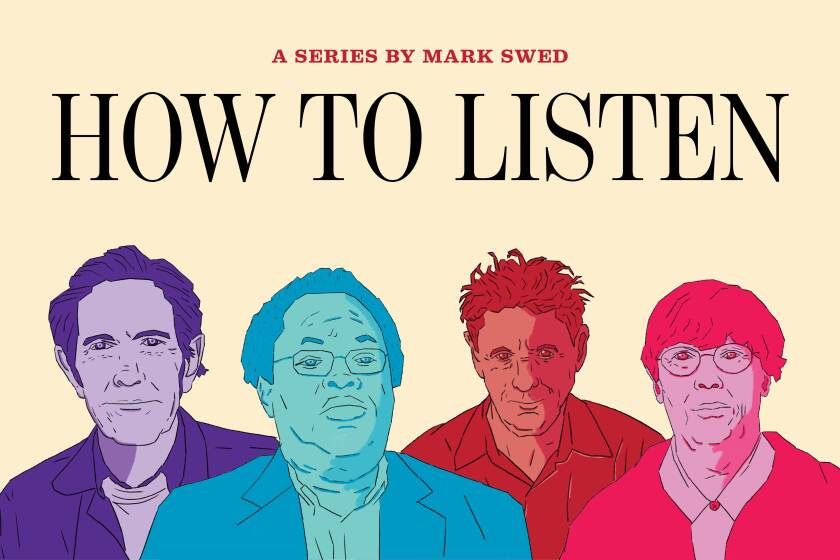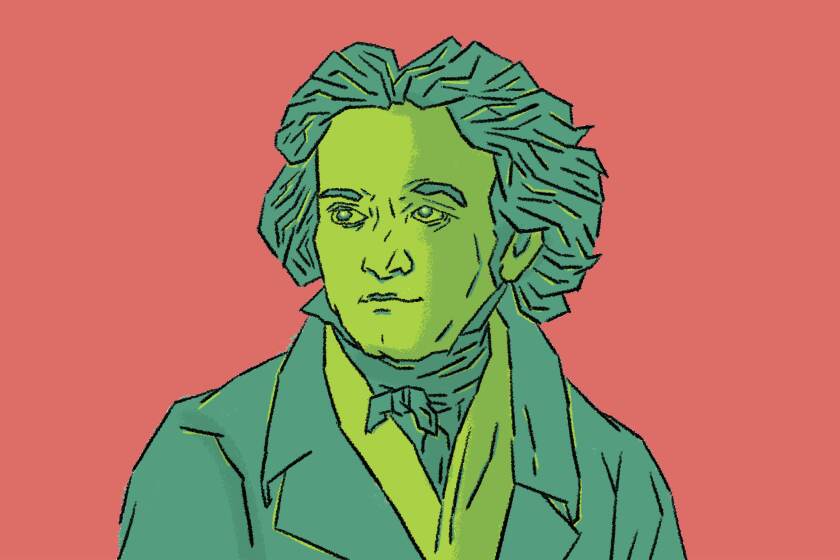It’s Beethoven’s 250th birthday. Our critic’s guide to the best new recordings
- Share via
On Wednesday, Ludwig van Beethoven’s birthday will be celebrated for the 250th time. I assume his abusive, alcoholic father wasn’t too plastered to have had baby Beethoven parties, and the composer is one who has never gone out of fashion.
Indeed, Beethoven has remained such a dominant, adversity-overcoming ode-to-joy-ster that even a pandemic hasn’t been able to blow out 250 brightly burning birthday candles lighting up a darkened world. The German city of Bonn, Beethoven’s birthplace, has faddishly branded the year BTHVN2020 and provided an online storehouse for events and tidbits the world over. Whom are they kidding? The so-called Beethoven year began in 2019, and BTHVN2020 has just officially extended celebrations to September 2021.
That’s a lot of Beethoven cake to clog the arteries. Lest BTHVN250 come to stand for a classical music disease, we need new and healthful options. I’ll take the heirloom sourdough slice with organic blueberries and raw, sprouted, unsalted almonds on top, please. Hold the whipped cream. Always hold the whipped cream.
This is not an unreasonable request, however unrelenting the Beethoven glut. The COVID-19 pandemic may have forced the cancellation of thousands of Beethoven performances around the world, but they have been replaced by thousands of performances Zoomed from musicians’ homes. Masks, social distancing, plastic barriers and audience restrictions have not prevented orchestras from performing live or streaming a composer whose music all but forces us to aspire to higher ideals, providing the wrenching roadmap from dark to light. No dike has been erected to stop the flood of new Beethoven recordings, books and articles.
The result may be far too much Beethoven, but that is nothing new. Since the Beethoven bicentennial surge 50 years ago, we’ve seen efforts to deal with the dulling effect from Beethoven overkill.
Fifteen years ago, Esa-Pekka Salonen began a “Beethoven Unbound” series with the Los Angeles Philharmonic in which he paired newly commissioned and recent pieces with the nine Beethoven symphonies. Last month, Salonen had been scheduled to conduct the Beethoven ballet “Creatures of Prometheus” with the L.A. Phil, but COVID-19 canceled those plans. That concert was to have included a piece by Swedish composer Anders Hillborg, whose “Beethoven Unbound” score, “Eleven Gates,” created a sensation and was recorded in 2006.
Salonen wasn’t the only one. Around the same time, Christoph Eschenbach did something similar with the Philadelphia Orchestra. Now, everyone does it. A Philadelphia Orchestra stream this Beethoven birthday week will precede a Beethoven piano concerto with Missy Mazzoli’s terrific “Ecstatic Science,” while the National Orchestra of Spain this week has positioned, before Beethoven’s Fifth, Mazzoli’s celestial “Sinfonia (for Orbiting Spheres),” which the L.A. Phil commissioned in 2013. Gustavo Dudamel ended the latest L.A. Phil Sound/Stage program by following the exuberant last movement of Beethoven’s Seventh Symphony with the exuberant ending of Gabriela Ortiz’s ”Corpórea.” The shoe fit.
Musicians easily get carried away when it comes to Beethoven. Norwegian composer Leif Inge’s “9 Beet Stretch” turned a radically slowed-down Ninth Symphony into 24 hours of sonic taffy. Venturesome German pianist Susanne Kessel commissioned 250 short piano pieces from all sorts of composers for the big birthday.
Coronavirus may have silenced our symphony halls, taking away the essential communal experience of the concert as we know it, but The Times invites you to join us on a different kind of shared journey: a new series on listening.
Gidon Kremer has been a violinist on the Beethoven case longer than most. In 1981, he made a startling recording of the Violin Concerto with Neville Marriner conducting the Academy of St Martin in the Fields. It begins as a probing, superbly played, seemingly conventional performance, until it reaches an avant-garde new cadenza by Alfred Schnittke acts like a foreign agent determined to hack the whole concerto. From that moment on, you listen differently.
Kremer’s latest recording, “Searching for Beethoven,” with cellist Mario Brunello and the Kremerata Baltica, begins with Brunello’s arrangement of “Muss es Sein? Es muss sein!,” a 1970s song by anarchistic French chanteur Léo Ferré. A Beethoven fanatic, the mesmeric Ferré liked to conduct Beethoven by walking up and the down the middle of an orchestra, pounding his fists in the air and reciting, angry, erotic, surreal poetry.
Beethoven wrote the question “Muss es sein?” (Must it be?) and the answer, “Es muss sein!” (It must be!), above a three-note figure with which he ended his last completed work, the String Quartet No. 16, Opus 135. Amid Brunello’s soulful cello and ensemble arrangement of Ferré’s hard-hitting song, a recording of the poet’s voice lashes out with a cri de coeur from his protest song: “Ludwig! Ludwig! Are you deaf?” “Music is a dying, Madam!” “We want music in the street! Beethoven Strasse! It must be. It will be!”
There is also something about Pierre Boulez being a shopkeeper. This becomes prelude to a string orchestra arrangement vibrantly conducted by Brunello, who brings an insightful (and inciteful) light to this last Beethoven enigma.
The rest of the generous recording contains Giovanni Sollima’s “Note Sconte” for string orchestra, in which the cellist composer sifts through Beethoven fragments of the String Quartet No. 14, Opus 131. That is followed by genuinely searching string orchestra performance of the profound quartet led and conducted by Kremer, each phrase a discovery. If I were to get but one new birthday-boy Beethoven recording, this would be it.
Two big pieces written in 1970 meant to catapult the Beethoven bicentennial into the European avant garde were “Ludwig van” by the the quixotic Mauricio Kagel and “Opus 1970” by composer-seer Karlheinz Stockhausen. It so happens that Gerald Barry studied with both. Kagel described the antic Irish composer as someone who didn’t drink but who composed as though he were drunk.
So true. There is no more wigged-out Beethovenian than Barry. His British colleague Thomas Adès, who instigated the premieres of two fantastical Barry operas for the L.A. Phil, is recording a set of Beethoven symphonies interspersed with pieces by Barry. In “Beethoven,” Barry sets the texts of Beethoven’s famous love letters to his “Immortal Beloved” for baritone and chamber ensemble, and it sounds like Ludwig inhaling laughing gas.
It is hard not to laugh out loud at times, and all the harder not to feel a little guilty in so doing. The more bizarre the piece becomes, the more touching. I hope someone can come along and explain to me why it is that this extraordinary score brings Beethoven to life in a way few portraits of the composer in any medium have. Adès’ bracing Beethoven performances with the Britten Sinfonia, for all their illuminating clarity, have a wit and wonder to them, as though Barry had sneaked in an illegal substance or two. Adès is thus far up to the Sixth Symphony (“Pastoral”), and he has competition in finding novel stimulants in Beethoven’s majestic nature ode. Martha Argerich and Theodosia Ntokou’s new recording of an arrangement for piano four hands refreshes as though the “Pastorale” were bathed in a crystalline mountain stream.
Beethoven’s A-minor String Quartet chronicles the composer’s illness and recovery. Nearly 200 years later, it’s a sonic window into our coronavirus world.
For the inquisitive Beethovenian, two books have come along this year that reveal the composer in an enlightening contemporary light. UCLA Beethoven scholar William Kinderman’s study, “Beethoven: A Political Artist in Revolutionary Times,” shows how the great composer maneuvered in times much like our Trumpian own. Paul Griffiths’ novel “Mr. Beethoven” puts the composer in modern-day Boston, actually maneuvering in our time.
Hardly a page goes by in either of these superbly written and complementary books without offering an unexpected reason to care about Beethoven.
More to Read
The biggest entertainment stories
Get our big stories about Hollywood, film, television, music, arts, culture and more right in your inbox as soon as they publish.
You may occasionally receive promotional content from the Los Angeles Times.













